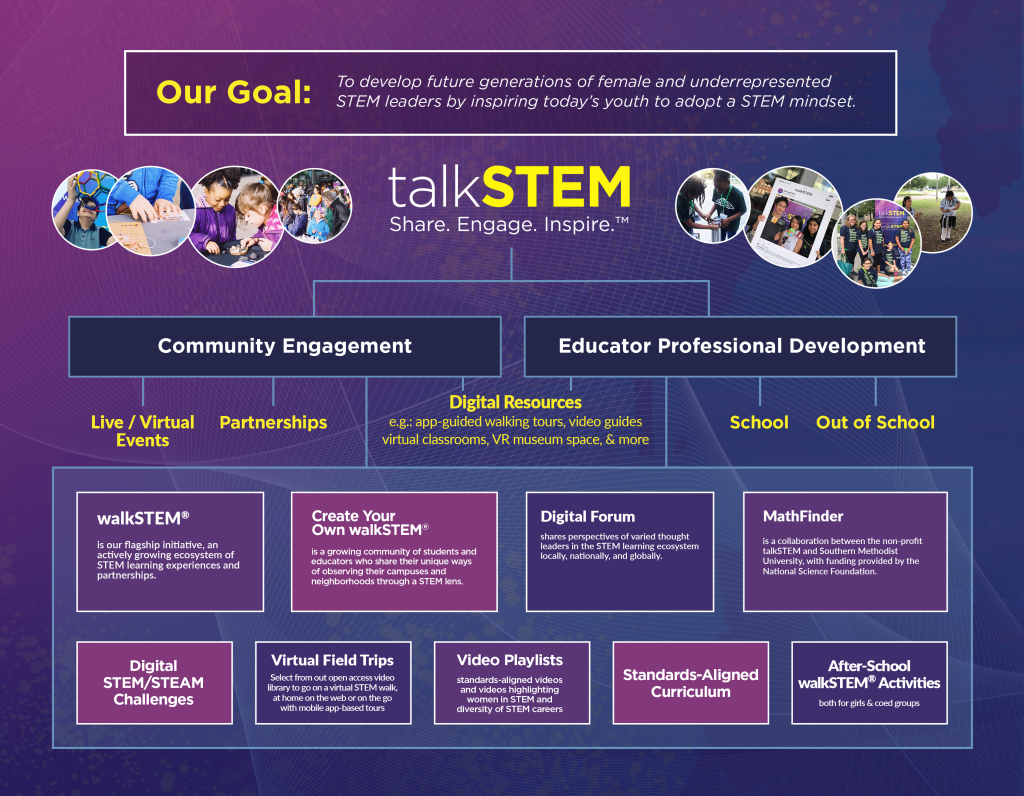We are a 501 (c)3 nonprofit organization working to empower all children from all income levels, ethnicities, and genders to see STEM not merely as a set of school-based subjects communicated through lectures and tests, but as a fluid and intriguing part of their daily lives, experiences, and environments. We believe that when educators are provided with an array of tools and resources which are rooted in real-world experiences and questions, they can more effectively develop the future generation of STEM leaders.

Over the next five years, American companies will need to add an estimated 1.6 million STEM-skilled employees. According to the U.S. Department of Education Data Snapshot, “the set of core cognitive knowledge, skills and abilities that are associated with a STEM education are now in demand not only in traditional STEM occupations, but in nearly all job sectors and types of positions.” New methods of learning and engagement are needed to build confidence and competence in STEM skills both inside and outside the classroom. This need is even more dire among women and ethnically diverse populations who continue to be underrepresented in STEM fields. With a population that is becoming more ethnically diverse and continues to be half female, this underrepresentation poses a challenge to the United States’ ability to cultivate a STEM-skilled workforce which drives innovation and technological advancement. talkSTEM is working to address this urgent need by creating a robust inventory of innovative STEM teaching enhancements and digital content, interactive learning activities, and real-world opportunities and events which are readily accessible to all students and educators (both in and out of school).
As the U.S. has transformed to an information-based economy, employment in science, technology, engineering and math occupations has grown much faster than job growth in general. Since 1990, STEM employment has grown 79% (9.7 million to 17.3 million) and computer jobs have seen a 338% increase. Low levels of achievement on standardized testing nationally contribute to low numbers of students feeling confident in STEM. The problem is heightened amongst girls and low income students. Although women make up 50 percent of the workforce, they only constitute 28 percent of the science and engineering workforce. African-Americans make up 11 percent of the U.S. workforce overall, yet represent only nine percent of STEM workers.Hispanics comprise 16 percent of the U.S. workforce, yet only seven percent of all STEM workers. Among employed adults with a bachelor’s degree or higher, blacks are just 7% and Hispanics are 6% of the STEM workforce (Pew Research Center, 2018). With a population that is becoming more ethnically diverse and continues to be 50 percent female, this underrepresentation poses an additional challenge to the United States’ ability to cultivate an adequate STEM workforce in the long-term. The gender gap is especially visible in the C-suite in information technology firms, where women are only 3% of CEOs and 20% of CFOs (Catalyst.org).
In order to meet this growing demand for STEM literacy among an increasingly diverse population, all students – regardless of their gender, ethnicity, or socio-economic background – need to build confidence and competence in STEM skills both inside and outside the classroom. talkSTEM was created to provide an array of tools and resources to educators, parents, and the community at large to build children’s STEM competence and confidence through real-world application of concepts. We partner with varied youth-serving organizations who share our goal of providing rich learning opportunities to all children and their educators.

“STEM ecosystems are pathways for improving STEM literacy, ensuring a strong workforce and global competitiveness for all, and an important means to support diversity, equity, and inclusion in a thriving STEM workforce. STEM ecosystems unite stakeholders from a variety of community-based organizations — including formal and after-school education, higher education, business, government, philanthropy, and the non-profit sector — to cultivate, innovate and work for common goals and actions surrounding world-class STEM opportunities for all learners.”
– Charting A Course for Success, America’s Strategy for STEM Education (Report by National Science and Technology Council, Dec. 2018)
Our great partnerships highlight the importance of building ecosystems that provide STEM educational experiences in varied settings. We are grateful to all our partners who work with us to better support children in the community through their education journeys.
talkSTEM provides a vast collection of digital resources that can be accessed by any parent or educator. These resources are housed in the talkSTEM Learning Suite, which contains activity tool kits, a free educational video bank, worksheets, online events, and online games for every child to use.
The walkSTEM® initiative is one example of a talkSTEM program that was created to invite children, families, parents, and educators, to observe their everyday environments through a STEM lens. Parents and educators have access to the free talkSTEM YouTube channel that contains all the walkSTEM® experiences talkSTEM has created so far. Students can use these videos to explore familiar and new locations, all while learning relevant science, technology, engineering, and math!
Want to get involved? Learn more about volunteer opportunities with talkSTEM.
Every child is a STEM child, Every space is a STEM space
talkSTEM works hard to make unique and high quality STE(A)M educational content freely available to all children. We partner with such youth-serving organizations as Dallas ISD, Girls Inc, Imagine Science, and more. Every dollar you contribute goes directly to our educational programming and content creation that reaches under-resourced student populations. Please support us.

